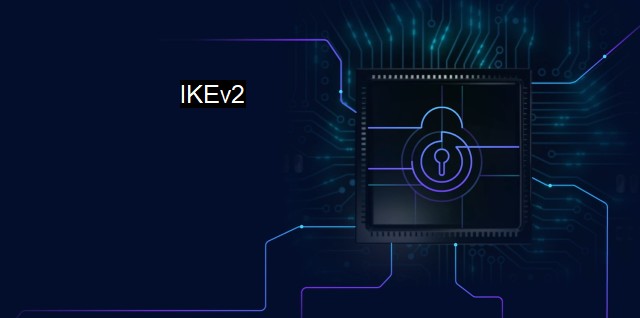What is IKEv2?
Enhancing Data Security with IKEv2: The Improved Protocol for VPNs and Internet-based Communication Systems
Internet Key Exchange version 2 (IKEv2) is one of the protocols utilized in establishing a Virtual Private Network (VPN), carefully engineered to create an efficient and reliable connection. IKEv2 forms a bridge that offers a manifold of advantages including strong encryption, resilience, fast speed, and automatic reconnection. This straightforward yet highly effective tunneling protocol carries a significant role in ensuring the safety of the digital environment.IKEv2 roots its central purpose in its two major processes: authentication and encryption. The double-layer protection makes certain that data traffic over a network remains unreadable, even to a potential outsider who has managed to intercept the communication line. This dexterity and granularity in providing advanced solutions for privacy and security are what make IKEv2 an ideal protocol for cybersecurity.
A closer look into IKEv2 reveals how it exceptionally maneuvers these two processes. The initial process creations justly refer to authenticity. Gestating from the derivative of the Internet Protocol Security (Ipsec), the protocol deploys digital signatures or digital certificates to validate the communicating parties. After the handshake, a session begins, confirming that each end-node is indeed who it purports to be. This halts third-party interlopers attempting to seize network control thru rogue access points, snooping, or man-in-the-middle (MITM) exploits.
The following task leverages the same strong handshake to establish an encrypted tunnel. Running beneath this is an intricate setup of cryptographic keys rotating periodically. This high level of variability makes it nearly impossible for cybercriminals to crack open the tunnel’s code, providing secured transmission of data to its destination– cybersecurity at its best.
Interestingly, IKEv2 thrives in the ability to maintain connection stability effectively. Any dropped or lost connection automatically prompts the algorithm for reconnection, keeping the encrypted tunnel alive. This is particularly useful in mobile communication environments with inconsistent Internet connectivity, bouncing between Wi-Fi, data, or disrupted by occasional spotty signals. IKEv2, prioritizing resilience, offers seamless switchover negating the risk of the session faltering into an unprotected mode.
Further, with the power of MOBIKE protocol, IKEv2 tunnel remains persistent despite an IP address shift. This protection ability fits perfectly into the growing virtual mobile world where users frequently move between networks. Thus, this ensures a continual and robust VPN security coverage as a result of the connectivity adaptability that the IKEv2 protocol offers.
Especially for organizations, robust connectivity promotes improved productivity. By virtue of its agility to handle network shifts efficiently, less hassling network readjustments are necessary for users on the go. This transparent network strengthening boosts engagement and activity on a computer's antivirus protection, a clever angle harnessed by IKEv2.
Still, it's essential to acknowledge that no technology is entirely foolproof. Although IKEv2 ranks high in cybersecurity and antivirus arenas, a subpar or even an unethical VPN service provider could pose threat vectors or inject malicious payloads into your network. After all, cybersecurity isn't one person's job–it's a mindfully orchestrated symphony involving end-users, developers, suppliers, and stakeholders towards harmonious, safe online navigation.
IKEv2, though a layer-3 protocol, is landmarked as one of the most secure VPN connections. Its operation and orchestrations are smartly designed to promote high-level encryption and steadfast data transfer. While the potential vulnerabilities lay more on the utilizers of this protocol, rather than the protocol itself, it is our unanimous responsibility to make the global digital community safer.

IKEv2 FAQs
What is IKEv2 and how does it relate to cybersecurity?
IKEv2, or Internet Key Exchange version 2, is a protocol used in VPNs (Virtual Private Networks) to establish secure and encrypted connections between devices over the internet. It is a critical component of cybersecurity as it ensures that data transmitted between devices remains private and secure.How does IKEv2 compare to other VPN protocols in terms of security?
IKEv2 is considered to be one of the most secure VPN protocols currently available. This is because it uses robust encryption algorithms, such as AES (Advanced Encryption Standard) and HMAC (Hash-based Message Authentication Code), to protect data transmitted between devices. Additionally, IKEv2 supports Perfect Forward Secrecy, which means that even if an attacker were to compromise one set of encryption keys, they would not be able to access future communication between devices.Is IKEv2 compatible with all antivirus software?
Yes, IKEv2 is compatible with most antivirus software. However, it is important to ensure that the antivirus software does not interfere with the VPN connection, as this can potentially compromise the security of the connection. To avoid any issues, it is recommended to use a reputable VPN provider that has been tested and verified to work with antivirus software.Can IKEv2 be used on mobile devices?
Yes, IKEv2 is fully compatible with mobile devices and is often the preferred VPN protocol for mobile users due to its ability to quickly establish and maintain stable connections, even when switching between different networks. Many VPN providers offer dedicated mobile apps that utilize the IKEv2 protocol to provide secure and reliable connections for mobile users.Related Topics
VPN protocols Data encryption Digital certificates Public-key cryptography Cyber threats
| | A | | | B | | | C | | | D | | | E | | | F | | | G | | | H | | | I | | | J | | | K | | | L | | | M | |
| | N | | | O | | | P | | | Q | | | R | | | S | | | T | | | U | | | V | | | W | | | X | | | Y | | | Z | |
| | 1 | | | 2 | | | 3 | | | 4 | | | 7 | | | 8 | | |||||||